Ramadan & Eid
Category Archives:Ramadan & Eid
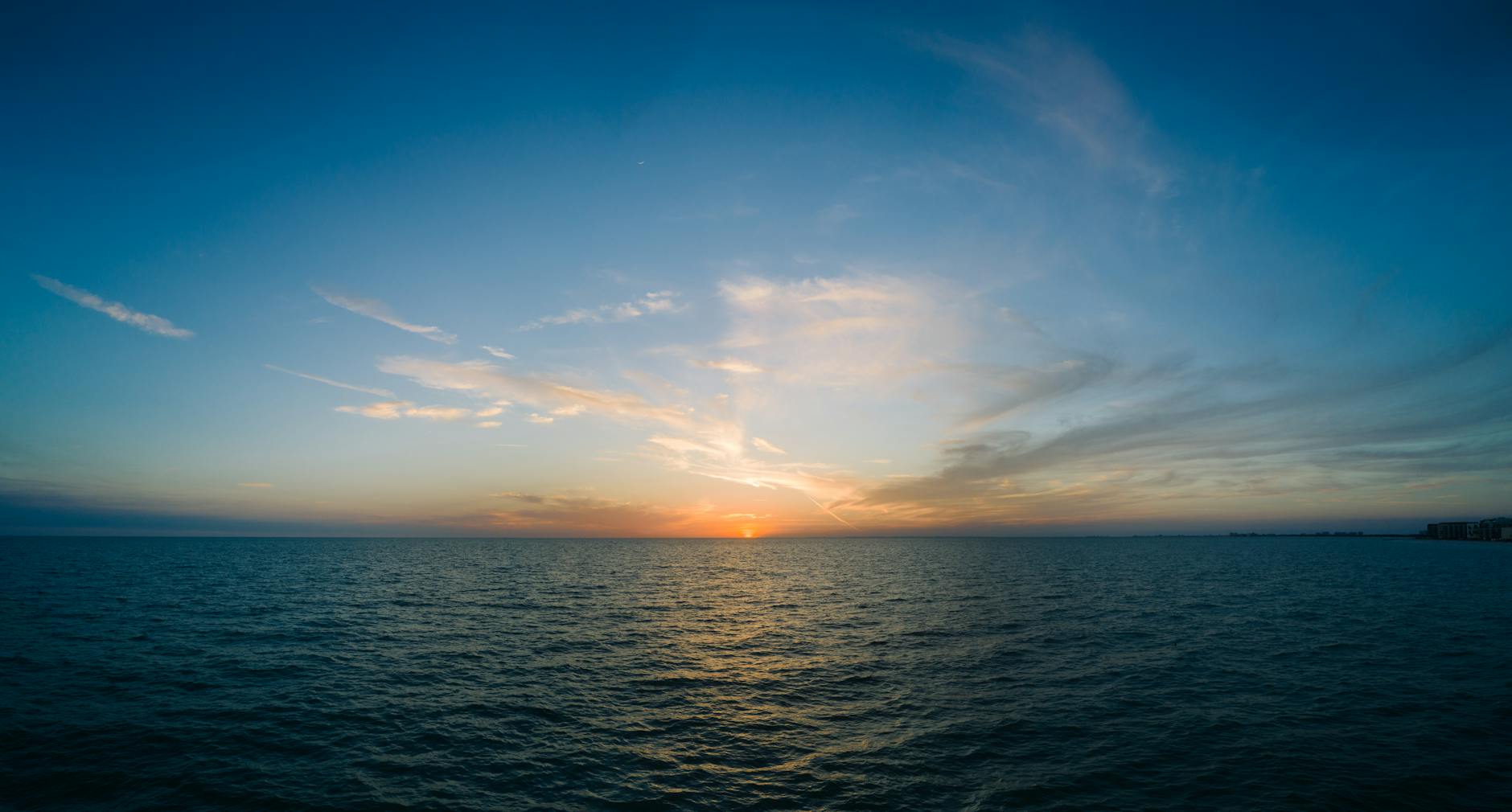
Limitless Rewards
Ramadan is upon us, and although it may not always feel like it, every day of fasting is a gift from Allah.
We are told in the hadith that Allah says “Every deed of the son of Adam will be given a ten-fold reward, up to seven hundred. Except fasting, for it is for Me, and I shall reward for it, for he gives up his desire and his food for My sake…”. This tells us there is no limit to what rewards we stand to gain from fasting.
So in this month, let us strive to fast for the sake of Allah. Let us control our cravings and desire, our thoughts and temper, and when the difficulties of fasting manifest, let us use that as an opportunity to remember Allah more. And be more willing to sacrifice for Him more.
Through this, we can hope to build a closer relationship with Him. And insha Allah He will give us the best of this world, and the Next.
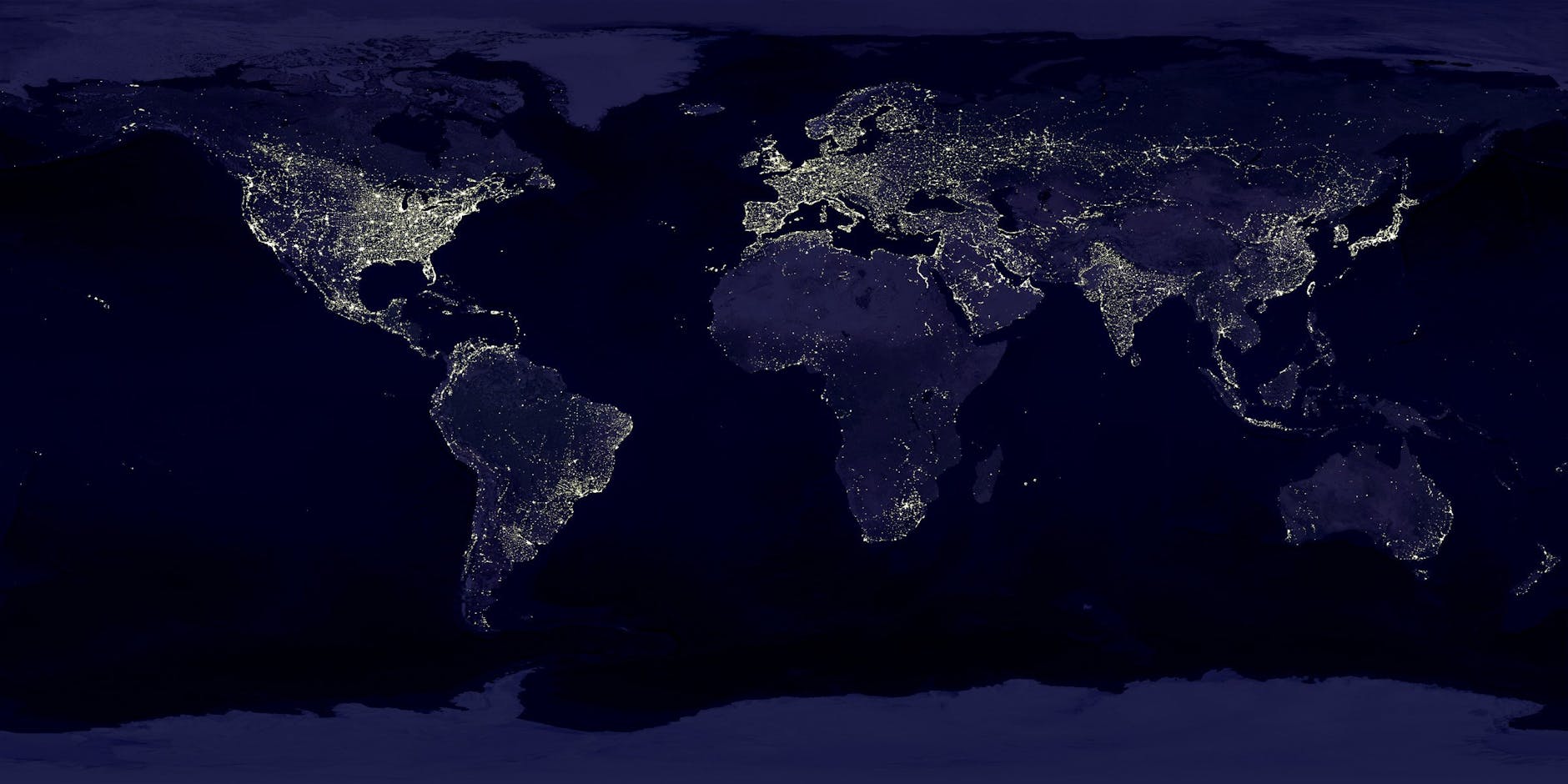
Fasting was given to every nation
Greetings to all believers, because the holy month of ramadan is again with us. We pray to Allah to make it easy for all of us who are qualified to keep the fast that we will be able to do so.
Remember Allah reminds us in His Holy words, He says, Wa anta suumu Khairul lakum If you keep the fast it will be better for you.
My brothers and sisters, fasting is a principle of Islam. But it is something that Allah has given to all human beings, because Allah says in the Quran, O you who believe, fasting has been prescribed for you, as it has been described to all those before you, in order that you may develop piety. So that Muslims should thank Allah that we have been blessed to make the month of Ramadan one of the institutions that will make us better in this world, as well as in the next.
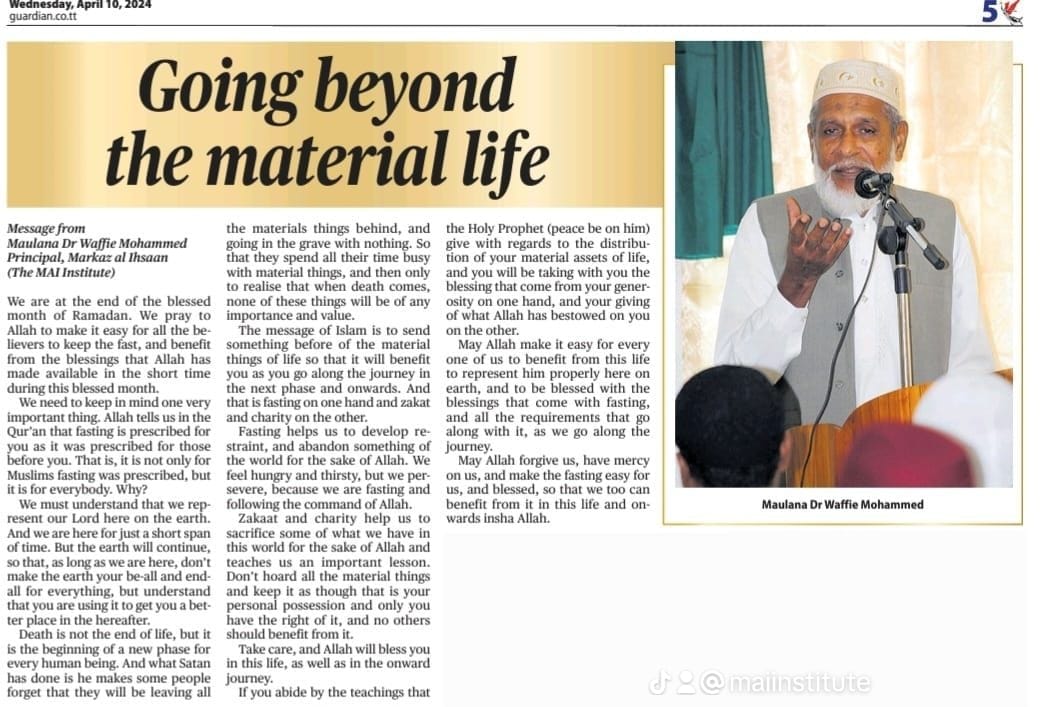
Going Beyond the Material Life
We are in the blessed month of Ramadan, and the month is moving very quickly. We pray to Allah to make it easy for all the believers to keep the fast, and benefit from the blessings that Allah has made available in the short time that is quickly passing, during this blessed month.
We need to keep in mind one very important thing. Allah tells us in the Quran Fasting is prescribed for you as it was prescribed for those before you. That is, it is not only for Muslims fasting was prescribed, but it is for everybody. Why?
We must understand that we represent our Lord here on the earth. And we are here for just a short span of time. But the earth will continue, so that, as long as we are here, don’t make the earth your be-all and end-all for everything, but understand that you are using it to get you a better place in the hereafter.
Death is not the end of life, but it is the beginning of a new phase for every human being. And what Satan has done is he makes some people forget that they will be leaving all the materials things behind, and going in the grave with nothing. So that they spend all their time busy with material things, and then only to realise that when death comes, none of these things will be of any importance and value.
The message of Islam is to send something before of the material things of life so that it will benefit you as you go along the journey in the next phase and onwards. And that is fasting on one hand and zakat and charity on the other.
Fasting helps us to develop restraint, and abandon something of the world for the sake of Allah. We feel hungry and thirsty, but we persevere, because we are fasting and following the command of Allah.
Zakaat and charity help us to sacrifice some of what we have in this world for the sake of Allah, and teaches us an important lesson. Don’t hoard all the material things and keep it as though that is your personal possession and only you have the right of it, and no others should benefit from it.
Take care, and Allah will bless you in this life, as well as in the onward journey.
If you abide by the teachings that the Holy Prophet (peace be on him) gave with regards to the distribution of your material assets of life, and you will be taking with you the blessing that come from your generosity on one hand, and your giving of what Allah has bestowed on you on the other.
May Allah make it easy for every one of us to benefit from this life to represent him properly here on earth, and to be blessed with the blessings that come with fasting, and all the requirements that go along with it, as we go along the journey.
May Allah forgive us, have mercy on us, and make the fasting easy for us, and blessed, so that we too can benefit from it in this life and onwards insha Allah.
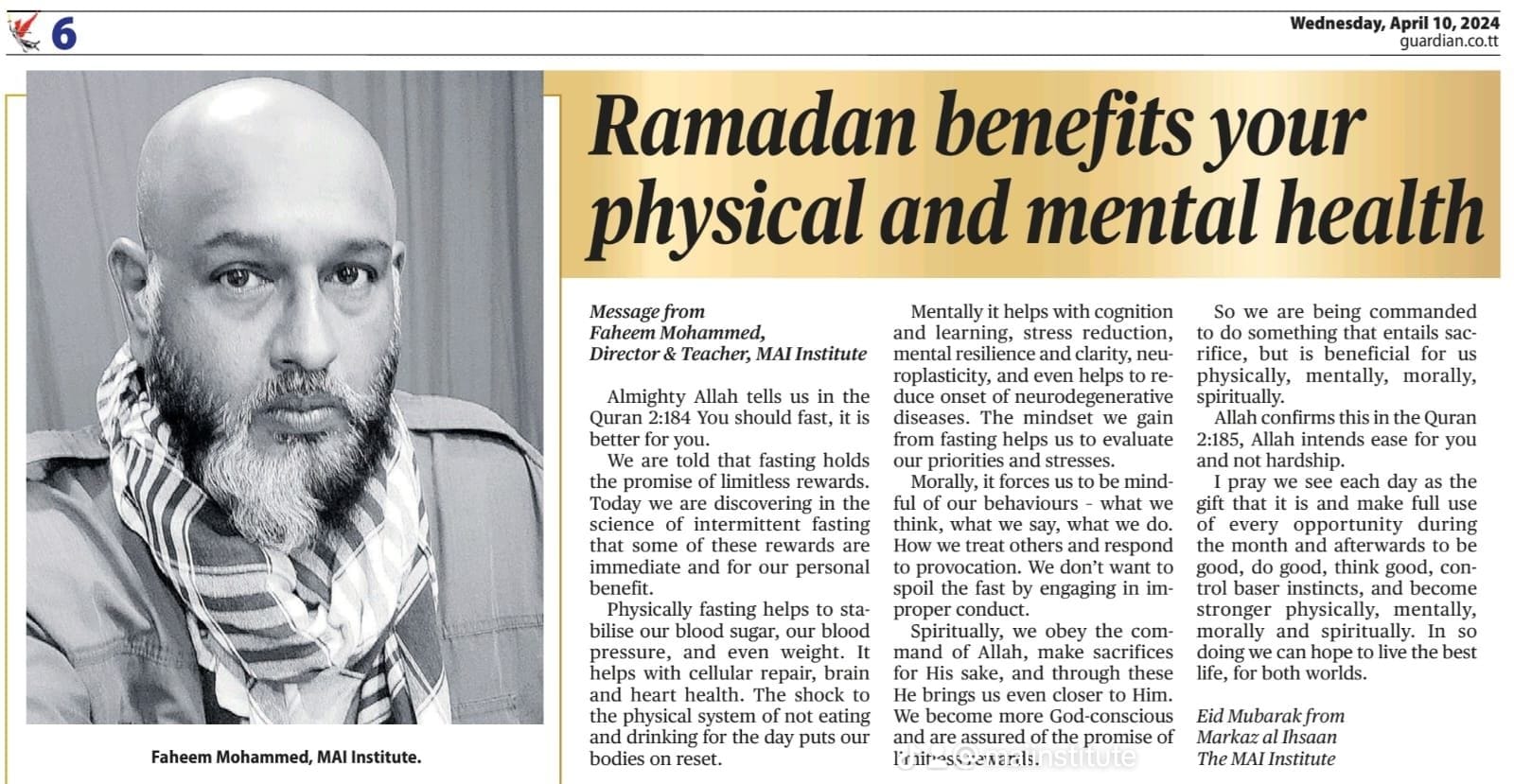
Ramadan Hack for Your Physical and Mental Health
Almighty Allah tells us in the Quran 2:184 You should fast it is better for you.
We are told that fasting holds the promise of limitless rewards. Today we are discovering in the science of intermittent fasting that some of these rewards are immediate and for our personal benefit.
- Physically fasting helps to stabilize our blood sugar, our blood pressure, and even weight. It helps with cellular repair, brain and heart health. The shock to the physical system of not eating and drinking for the day puts our bodies on reset.
- Mentally it helps with cognition and learning, stress reduction, mental resilience and clarity, neuroplasticity, and even helps to reduce onset of neurodegenerative diseases. The mindset we gain from fasting helps us to evaluate our priorities and stresses.
- Morally it forces us to be mindful of our behaviors – what we think, what we say, what we do. How we treat others and respond to provocation. We don’t want to spoil the fast by engaging in improper conduct.
- Spiritually we obey the command of Allah, make sacrifices for His sake, and through these He brings us even closer to Him. We become more God-conscious, and are assured of the promise of limitless rewards.
So we are being commanded to do something that entails sacrifice, but is beneficial for us physically, mentally, morally, spiritually…
Allah confirms this in the Quran 2:185 Allah intends ease for you and not hardship.
I pray we see each day as the gift that it is, and make full use of every opportunity during the month and afterwards to be good, do good, think good, control baser instincts, and become stronger physically, mentally, morally and spiritually. In so doing we can hope to live the best life, for both worlds.
Ramadan Mubarak from Markaz al Ihsaan – The MAI Institute.
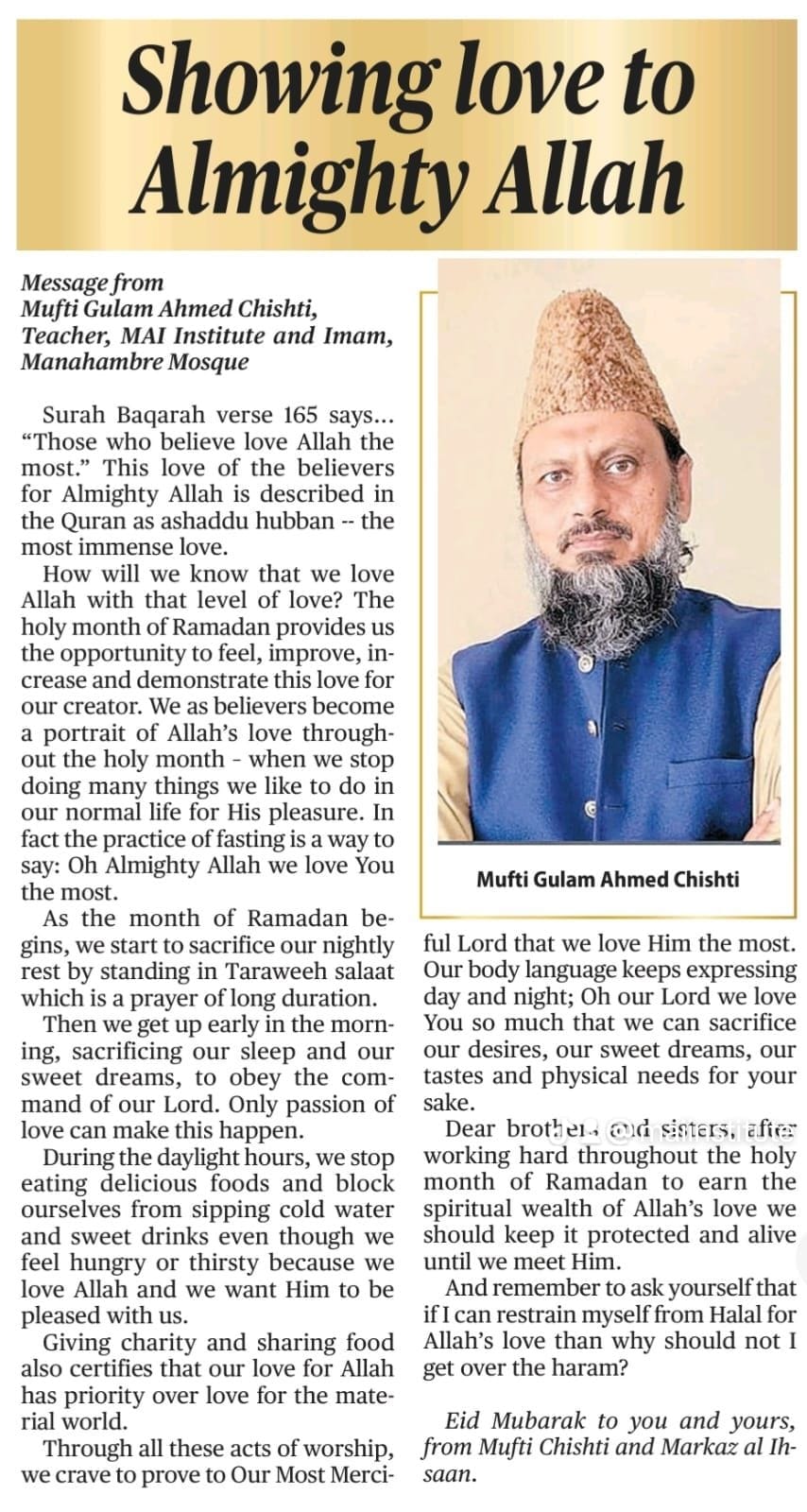
Showing Love to Almighty Allah
Surah Baqarah verse 165 says… “Those who believe love Allah the most.” This love of the believers for Almighty Allah is described in the Quran as ashaddu hubban – the most immense love.
How we will know that we love Allah with that level of love? The holy month of Ramadan provides us the opportunity to feel, improve increase and demonstrate this love for our creator. We as believers become a portrait of Allah’s love throughout the holy month – when we stop doing many things we like to do in our normal life for His pleasure. In fact the practice of fasting is a way to say: Oh Almighty Allah we love You the most.
As the month of Ramadan begins, we start to sacrifice our nightly rest by standing in Taraweeh salaat which is a prayer of long duration.
Then we get up early in the morning, sacrificing our sleep and our sweet dreams, to obey the command of our Lord. Only passion of love can make this happen.
During the daylight hours, we stop eating delicious foods and block ourselves from sipping cold water and sweet drinks even though we feel hungry or thirsty because we love Allah and we want Him to be pleased with us.
Giving charity and sharing food also certifies that our love for Allah has priority over love for the material world.
Through all these acts of worship, we crave to prove to Our Most Merciful Lord that we love Him the most. Our body language keeps expressing day and night; Oh our Lord we love You so much that we can sacrifice our desires, our sweet dreams, our tastes and physical needs for your sake.
Dear brothers and sisters, after working hard throughout the holy month of Ramadan to earn the spiritual wealth of Allah’s love we should keep it protected and alive until we meet Him.
And remember to ask yourself that if I can restrain myself from Halal for Allah’s love than why should not I get over the Haram?
Eid Mubarak to you and yours, from Mufti Chishtie, and Markaz al Ihsaan.
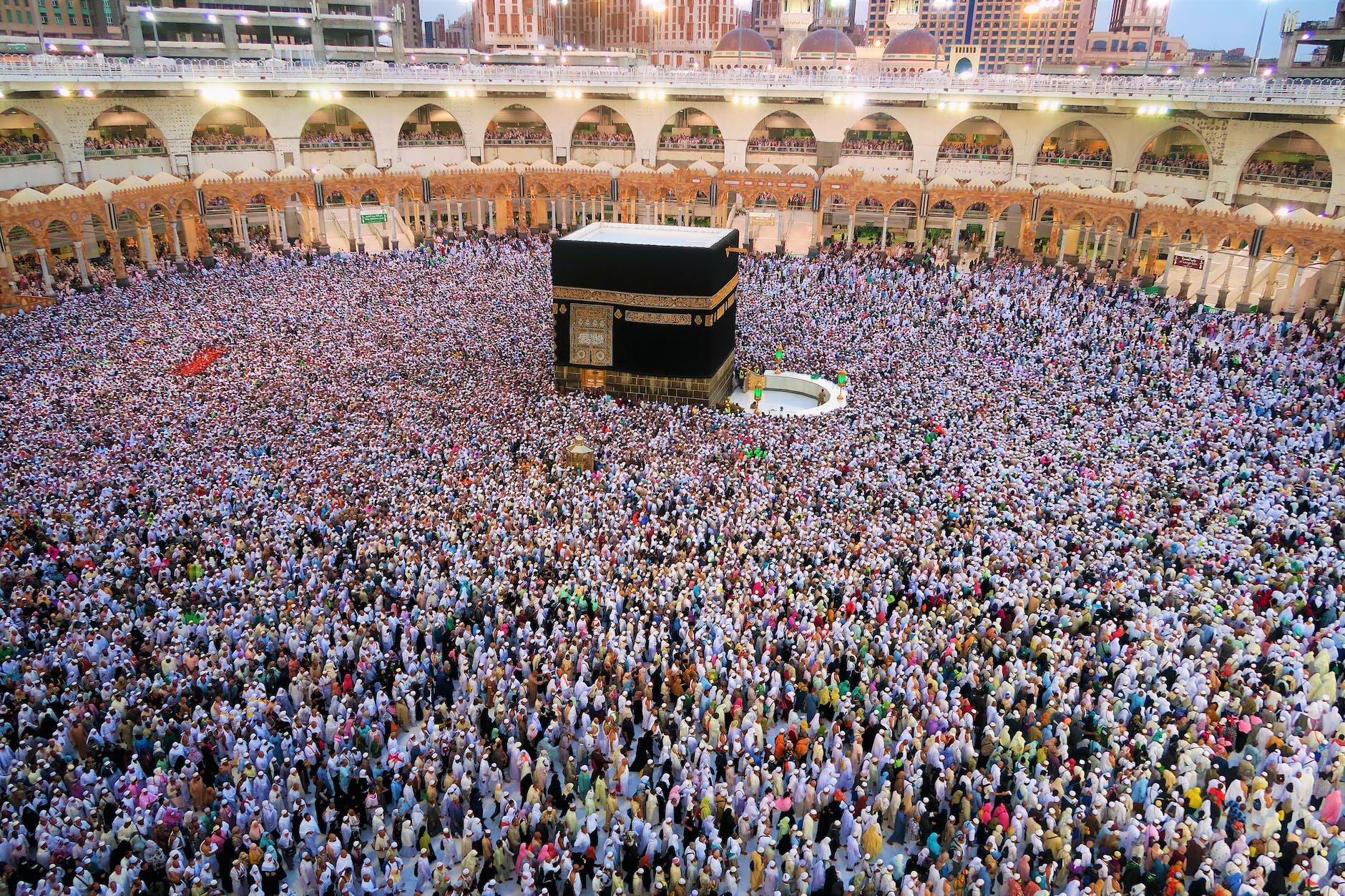
Youth perspective of Submission to Eid ul Adha
Br. Saleem Ali
Student, Islamiyat Yr. 2, MAI Institute
The word submission according to Collins Dictionary is the act of submitting, surrendering something to someone or yielding to someone or to something.
However, my dear brothers and sisters, the word submission, In Islam, means “submission to the will of Allah Almighty, alone”
What does this mean “submission to the will of Allah Almighty?” Simply put, it is the state of mind of anyone who recognizes Almighty Allah absolute authority and reaches a conviction that Almighty Allah alone possesses all power; no other entity possesses any power or control independent of Him.
Wa mai yabtaghi ghairal Islaami deenan falany yuqbala minhu wa huwa fil Aakhirati minal khaasireen
“And whoever seeks a way other than this way a submission (Islam), will find that it will not be accepted from him and in the Life to come he will be among the losers”
(Sura Al Imran, 3:85)
So, my dear brothers and sisters, in this life, we have a choice: either be among the winners, i.e., Islam or among the losers.
Nowadays, the focus is on our youth to become additional pillars of Islam and in the analogy of a concrete pillar, it is only as strong as its construction. Unfortunately, with the advent in technology, many of our youths are increasingly tempted to cross the threshold of being lost to the material needs of this duniyah, this world, where our existence is finite and definite.
We are seeing presently that most of our youths today, instead of being present in the Masjids for the five daily salah or other activities, they instead prefer to be at other venues. Now, we cannot wholly and solely cast blame on them for this behavior, as there are various sources of reasoning.
How, my dear brothers and sisters, how can we encourage our Muslim youths to return to the folds of Islam, to increase their Iman and only be submissive to Almighty Allah?
All the Prophets, from Adam (A.S) to Muhammad (saw) were once youths and they themselves were subjected to numerous temptations and many persecutions, which they could have easily given up. However, these temptations were futile and in fact, served to increase their Iman, their dependency, their submissiveness to Almighty Allah, to resolve their situations.
إِنَّهُمْ فِتْيَةٌ آمَنُوا بِرَبِّهِمْ وَزِدْنَاهُمْ هُدًى
innahum fityatun amanoo birabbihim wazidnahum hudan
indeed, they were youths who believed in their Lord, and We increased them in guidance.
(Surah Al-Kahf, Quran 18:13)
Prophet Ibrahim (a.s) was born into a family of idolaters and in fact, his father was a famous idol sculptor. He was born in a generation where people either worshipped the idols made of wood and stone or the planets, moon, sun, and stars.
However, miraculously at a very early age, Almighty Allah blessed Prophet Ibrahim (AS) with wisdom and spiritual understanding. This made him question everything that he saw, and regardless of how much his father tried explaining to the child their faith, Prophet Ibrahim (AS) never felt content and satisfied deep down in his heart.
In his childhood, Prophet Ibrahim (a.s), used to call out to the passersby and asked them, “Who will buy my idols? They will not hurt you, nor will they help you.” He would then mock the idols by forcing them to drink water to prove to the people that there is no point in worshipping the Gods that cannot even defend themselves. On listening to this, Prophet Ibrahim’s (AS) father scolded him and asked that he leaves the house.
In short, even after being born in a house of idol worshippers, Prophet Ibrahim (AS) keenly searched for the true light and the real God throughout his childhood. One day, Allah SWT granted him the blessing of becoming the Messenger and Prophet of the Almighty.
Prophet Ibrahim (a.s), after many generations of seeking Almighty Allah mercy to grant him and his wife Hagar a child, was answered with the birth of his first born, Ismail (a.s).
My Lord! Bless me with righteous offspring (Surah Al Saffat 37:100)
So We gave him good news of a forbearing son (Surah Al Saffat 37:101)
From an early age, Prophet Ismail (AS) walked in his father’s footsteps and was a devoted believer of Allah SWT. When he was an infant, the gift of Zamzam was given to satisfy his thirst, when Almighty Allah commanded his father to leave Ismail (a.s) and his mother, Hagar, in an uncultivated valley in the Arabian Peninsula.
After Ibrahim (A.S.) had helped his wife and child to dismount, he left them with a small amount of food and water which was hardly enough for 2 days. He turned around and walked away. Hagar hurried after him asking: “Where are you going Ibrahim, leaving us in this barren valley?”
Ibrahim (A.S.) did not answer her but continued walking. She repeated what she had said, but he remained silent. Finally, she realized that Allah Had Commanded him to do this. She asked him: “Did Allah command you to do so?” Ibrahim (A.S.) replied: “Yes.”
Then his great wife said: “We are not going to be lost since Allah Who Has Commanded you is with us.”
During those days, there was nobody in Makkah nor was there any water. Ismail’s (A.S.) mother went on suckling Ismail (A.S.) and drinking from the water she had. When the water in the water skin was consumed, she became thirsty and Ismail (A.S.) also became thirsty.
She started looking at her son, tossing in agony. She left him, for she could not endure looking at him, and found that the mountain of As-Safa was the nearest mountain to her on that land. She stood on it and started looking at the valley keenly so that she might see somebody, but she could not see anybody. Then she descended for As-Safa and when she reached the valley, she tucked up her robe and ran in the valley like a person in distress and trouble till she crossed the valley and reached the mountain of Al-Marwa. There she stood and started looking expecting to see somebody, but she could not see anybody. She repeated that running between Safa and Marwa seven times.
When she reached Al-Marwa (for the last time) she heard a voice and she asked herself to be quiet and listened attentively. She heard the voice again and said:
“O whoever you maybe! You have made me hear your voice; have you got something to help me?”
And behold! She saw an angel at the place of Zam-zam, digging the earth with his heel (or his wing) till water flowed from that place. She started to make something like a basin around it, using her hand in this way, and started filling her water skin.
As reported in Sahih Al-Bukhari: 3362 and 3363, Narrated Ibn `Abbas: The Prophet (saw) said, May Allah bestow His Mercy on the mother of Ishmael! Had she not hastened (to fill her water-skin with water from the Zamzam well). Zamzam would have been a stream flowing on the surface of the earth.
One night, Prophet Ibrahim (AS) experienced a dream in which Allah SWT asked him to sacrifice his beloved son, Prophet Ismail (AS). Initially, Prophet Ibrahim (AS) took it as the devil’s trick on him and immediately dismissed it. However, when the same dream occurred for three consecutive nights, Prophet Ibrahim (AS) acknowledged it as a divine message from the creator, Almighty Allah.
Despite his love for his only son, Prophet Ibrahim (AS) intended to go through with the sacrifice. He took his child Prophet Ismail (AS) along with a knife and a rope to the top of Mount Arafat. Upon reaching the spot, Prophet Ibrahim (AS) told his son about the dream and the command of Almighty Allah.
The obedient son immediately obliged and asked Prophet Ibrahim (AS) to blindfold himself so that he does not have to suffer. Prophet Ismail (AS) also requested his father to tie his legs and hands so he may not struggle.
Then when the boy reached the age to work with him, Abraham said, “O my dear son! I have seen in a dream that I ˹must˺ sacrifice you. So, tell me what you think.” He replied, “O my dear father! Do as you are commanded. Allah willing, you will find me steadfast.”
(Surah Al Saffat 37:102)
Therefore, Prophet Ibrahim (AS) did as his son had said. He tied the legs and hands of Prophet Ismail (AS) and blindfolded himself. Prophet Ibrahim (AS) then took the knife and fulfilled the wish of Almighty Allah. But to his surprise, when he took off the blindfold, he saw the body of a white horned ram in front of him, whereas Prophet Ismail (AS) stood beside him, completely unharmed. However, Prophet Ibrahim (AS) thought he had failed the trial, but then he heard a voice that told him that he does not need to worry, and Allah SWT always looks after his followers. This strengthened his faith.
We called out to him, “O Abraham!
You have already fulfilled the vision.” Indeed, this is how We reward the good doers.
(Surah Al Saffat 37:104 – 105)
So, my dear brothers and sisters, it is important for us to encourage our young people to emulate the youths in the Quran, as they would eventually become Almighty Allah vicegerent in this world and to use them as the present-day role models. All these youths it was not easy for them. It was difficult, and they had to go through trials and tribulations.
The significance of Eid-ul-Adha is that it commemorates Prophet Abraham (a.s), Hagar, and Ismail’s (a.s) trust and obedience to Almighty Allah.
Islam teaches that our life on earth is a test of our faith in God, our level of submissiveness, what we would sacrifice and how much for the sake of our creator. It is not limited to the physical sacrifice of animals.
Eid-ul-Adha reminds us to remain hopeful. Almighty Allah will rescue us from our difficulties and reward us with happiness, because that’s who Almighty Allah is, Al-Khaaliq, the Creator and to whom we belong and to whom we return.

Maulana Dr. Waffie Eid Message
Praises are for Allah, the Originator of the skies and the earth. Peace and salutations on His beloved servant – the Final Messenger that was sent to mankind. We thank the Lord for blessing us to witness another month of Ramadan. We pray to Allah to bless our fasting, prayers and sacrifices we make during the Holy Month.
Today, we join with our brothers and sisters from all over the world by celebrating Eid.
As every single human is a representative of the Lord here on earth, everyone is required to develop certain moral and spiritual discipline. Everyone is required to show restraint. Because it is sometimes difficult to restrain ourselves, Allah, out of love and mercy for us, gave us an institution designed to help us resist material distractions through fasting. He tells us in the Holy Qur’an, “Fasting is prescribed for you as it was prescribed for those before, in order that you will be able to establish restraint.”
Every individual is required to culture and cultivate some of the qualities contained in the Divine Attributes. Each person must always keep in mind the important fact that he or she is living on earth just for a span of time and before we can imagine we can die and leave all the material things behind. Ramadan teaches us to become conscious of
- Our use of our material blessings to help us become better representatives of the Lord here on earth
- Control of our desires and passions
- Be conscious of the fact that we are living amongst other human beings, and we are required to interact with them in a special way
All human beings are required to keep in mind the important fact that Allah says, “If He were to take mankind to task for all the wrong they do, there will not be a single one left.”
Our mission on earth is to behave like the Lord as best we can. And knowing that we can have a lot of short comings, we benefit ourselves by fasting in Ramadan, observing extra acts of worship and giving charity.
Ramadan teaches us to humble ourselves before our Lord and develop righteousness as much as possible. Because Fasting in Ramadan is for one month, we will be able to cultivate some of the righteous deeds through restraints. Therefore, we feel happy when Eid comes, as we are able to restrain ourselves.
Let us thank our Lord for His blessings and let us continue to try to uphold the permissible and avoid the prohibited.

Swimming Against the Tide (MAI Eid Message)
The occasion of Eid is a good opportunity to take stock.
We have undergone a spiritual and physiological ‘disruption’ for the past month, and mentally we have been careful to guard our conduct, our words and thoughts to make sure we don’t ‘spoil the fast’. On a day like today, we can reflect on the past month – the highs and lows – and see how we can respond differently in the future. That is to say, we can use our experiences of the past month to guide us through the next Ramadan.
It is also a good time to take stock in looking at the community as a whole. That we are coming out of pandemic restrictions, we have a rare opportunity to reflect on the past few years, and redefine what we would like the future to look like, as we rebuild, restart and redirect our efforts and those in our charge. Going back to how things were might be comfortable, but it certainly won’t be ideal.
As we position for the years to come, at an individual and community level, it is our hope that we can become a stronger force, more united and more directed towards lifting each other up. This cannot only be lip-service, however. Efforts to tear down barriers and old habits must be undertaken. For some, it may be a new way of thinking. For others, it may be sharing resources or the spotlight. Or climbing off a pedestal and getting back in touch with the troops on the ground.
Whatever the resulting decisions and required actions may be, now is the perfect time to take charge of the future and redefine what direction our efforts would take, to what intended outcomes. We owe it not only to ourselves, but to the future and upcoming generations, who themselves have very little to look forward to.
This Eid, let us resolve that the renewed habits and new thinking can steer us towards a brighter future, as a more united body. Let us commit to be the representative of Almighty Allah, and be a brighter light in a growing flood of darkness; a beacon that calls others towards safer ground. And hopefully, when we take stock at the next year’s Eid, we can look back with satisfaction, and look forward with greater hope.
At the MAI, we are happy that we were able to do our small part towards demonstrating a commitment to development for everyone – at the individual and community levels. We look forward to even more in the coming year, working alongside you, so that we all can ‘Live the best life. For both worlds.’
May this day of Eid give you peace, solace, comfort, opportunity and drive to define and realise a brighter tomorrow.
Eid Mubarak
MAI Institute
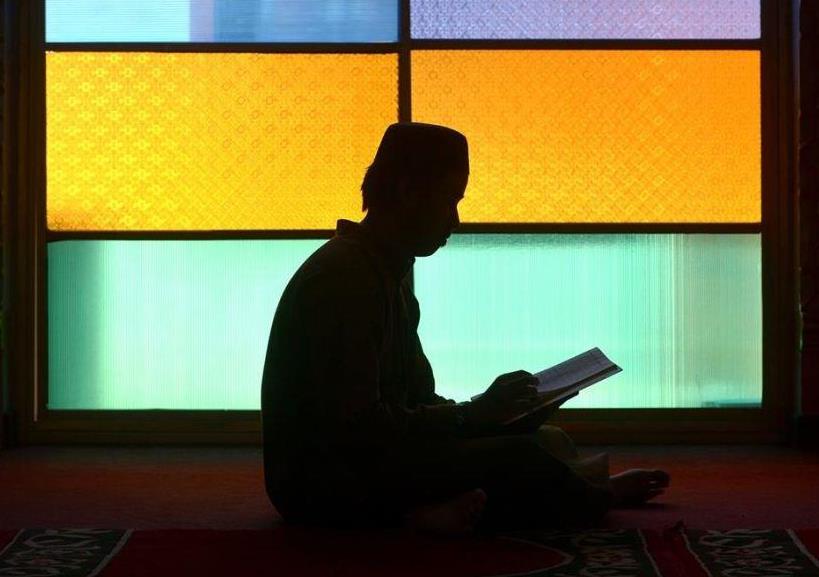
10 Days of Upheaval: Entering the Homestretch of the Month of Ramadan
The following was submitted to the Guardian newspapers by Director and Faculty, Faheem Mohammed, for Ramadan 2022.
We are into the last ten days of Ramadan, and we have entered into the home stretch towards Eid ul Fitr. This last third of the month is a significant one, where extra worship tends to intensify. In one hadith we are told that the Holy Prophet Muhammad (peace be on him) used to exert himself in extra devotion during the last 10 nights – to a greater extent than any other time.
In this last 10-day period is the Laylatul Qadr – the Night of Power – a special night in the Islamic calendar, and one which holds significance for a number of events. In particular, it is the night in which Almighty Allah showers worshippers with an abundance of blessings and mercy, sins are forgiven and du’as (supplications) are accepted. The Holy Qur’an tells us the blessings of this night are worth more than 1000 months – that’s 83 years’ worth of blessings in 1 night. What night is it? While most agree and observe it on the 27th night, we are told in one hadith to seek it on the odd nights in the last ten nights. That’s a lot of blessings.

The night of Laylatul Qadr for blessings is akin to being told there is one day of one month wherein, should you try to withdraw cash from the ATM, you would have unlimited sums to withdraw from. There’s no one I can think of who would miss such an event. And the withdrawals done on that night can set one up nicely for the rest of the year, until that day rolls around in 1 years’ time.
When considered as one such night each year, the result is that over an average lifetime the blessings would be exponentially accrued. Needless to say this is a profound institution for the Muslim mind. An All-Knowing, All-Seeing, Most-Merciful, Most-Forgiving God who promises a lifetime of blessings and benefits in one night – individually – based on that person’s intentions and efforts, can prove quite the motivation. It means that despite your mistakes and your shortfalls, despite you yourself not being merciful or patient consistently – there is a chance to wipe the slate clean, seek forgiveness from the Almighty, and establish a better basis for the year to come.
In this last 10-day period there is also the practice of Itikaf or spiritual retreat. This involves isolation in a mosque or home for the purpose of dedicated worship of Almighty Allah for the last 10 days of Ramadan. Typically done in the mosques throughout the world, persons would enter the mosque on the 10th night, and stay for the remainder of the month engaged in worship, when not attending to their daily needs. There are some rules to follow, and some acts that nullify the efforts, so it is something those pursuing take seriously and are careful about.
Here we find yet another institution that is designed to bring a person closer to Almighty Allah. Concerns for people and matters of the world are sidelined in favor of worship and self-reflection, and perhaps this is why it is reported in one hadith that the person who observes itikaf will obtain the reward of two Hajj (Pilgrimage to Makkah) and two Umrah (circumambulation around the Kaaba) (Bayhaqi). In addition, we find recurring themes of detachment from the world, training or re-training oneself to proper conduct and mannerisms in accordance with Islamic instructions, and a stronger relationship with, and trust in Almighty Allah to look after our affairs. While the outcomes of this retreat tend to be very individual and personal (different people would come out of the exercise with different takeways and impressions) it is hoped that all enjoy purification of their intentions and a renewed vigor in the practice of their faith.
The last 10 days represent the essence of the month of Ramadan. The submission to God’s command through individual self-sacrifice of fasting continues. The need to guard one’s conduct and behavior while undertaking the fast stays top-of-mind. The recognition of the struggles routinely endured by those who are less fortunate keeps one grounded, and is accompanied by increase in the dispensation of charity – itself an ability that persons tend to be more thankful for. The seeking of the night of Laylatul Qadr, and the efforts of even extra worship on this night and in itikaf hold the promise of rewards to be enjoyed either in this life, or the next, if not both. And accompanying all of these, a reminder to not be too attached to the life of this world, or not be a slave to our indulgences and cravings, helps us to temper our materialistic outlook and reinforce the accountability that we believe will occur on the day of Judgement – a day when we will be taken to task for our behaviors and stewardship of our resources in this life, based on our intentions. To state it differently, what people think about you on social media matters very little when you are hungry or ‘dying of thirst’.
Through this annual exercise and adherence to the will and command of Almighty Allah, we are able to not only refine our behaviors but also reestablish our priorities, so that we can continue to strive for the increased welfare of ourselves, our families and our communities, and realise benefit in this world, and the world that is to come.
We pray that Almighty Allah allows us to participate in, and benefit fully from, the last 10 days of Ramadan, and guide us through this period to emerge as stronger and better individuals and communities, for the benefit of our society.

Ramadan: Making Diamonds out of Deen
We are well into the month of Ramadan at the point of writing, and we may well be beginning to feel the physiological effects of the fast. In such instances, it is useful for us to remember the reason why we adhere to a process that is essentially unnatural. After all, to deprive the body of sustenance – albeit voluntarily – is not without effects. Dehydration, loss of concentration, tempers may be a bit short, acid reflux and gas pains, perhaps. Exhaustion may begin to seem chronic. And these even as we marvel at the speed of the passing days. So why do we do this to ourselves? What’s the point?
An interesting parallel can be drawn from the very element that makes us who we are, and which can help illuminate the experience and the outcomes of fasting for the month of Ramadan.
Carbon – The Foundation of Diverse Lifeforms
A naturally occurring substance is carbon, an element which is described as the chemical basis for life.
It is as essential as it is versatile. It is essential in that it moves through the food chain, from plants (through photosynthesis) to animals (in the form of carbohydrates and proteins) and back to plants (as carbon dioxide and from decay). It is versatile in that it forms various compounds. One example of carbon is the diamond while another example is that of charcoal. And what a world of difference exists between the two.
Diamonds are formed slowly, deep in the earth, under tremendous pressure and heat. Buried deep in the earth, constantly facing heat and pressure acting on it, a conscious carbon element in diamond must think its life as one of misery and hardship. But it rallies on (not that it has much choice), and all the imposing pressures make it bigger and stronger with the passing of time. And persons, hearing of its existence, expend significant effort to try to find it. Scouring the planet for veins, digging deep, searching carefully, and upon finding it, erupting in joy – here is something of value and worth that would change our fortunes.
The bigger the diamond, the greater its significance. Carefully secured and handled, it is cut and polished, mounted and sold for significant sums. And the recipient? They would be sure to secure it, and use it to adorn themselves in select company.
In this context the diamond is looked upon adoringly, and maybe even with envy. And it is often with pride and joy that one generation passes it on to the other, so that they too may savor its worth and the results of its ownership. And of course, with the passing of time its value increases.
Its sale by auction is announced well ahead of time, so persons can prepare for bidding and hopefully its ownership. They want this for themselves, and would compete with others to try to get it. Such is its value and worth – a far cry from its years buried deep in the earth and undergoing all the stress. This new life would be a paradise compared to that time. And well deserved – it went through all the hardships to get here.

Compared to diamonds, charcoal, on the other hand, has a very different experience. It lives close to the surface, and undergoes minimal heat and pressure. A conscious carbon element in charcoal must think it is living it up. Close to or at the surface, enjoying the sights and sounds. A little stress here or there, not lasting very long… life is good. This charcoal is readily found in large quantities in most places on earth. Or it can be made – since it takes little effort to produce – not much heat, pressure or depth is required.
It is a soft material – easily fragmented, and deliberately broken into small pieces in process where it is not handled with much care. It is bagged in bulk, moved through handlers to the daily markets, and offered for sale where its price is haggled over – the cheaper the charcoal the better. It has little value in itself – we use it as fuel for other products that we crave – perhaps a savory barbeque or tandoori with nan.
Little thought and attention is given to the charcoal in the course of its use. And persons would handle it begrudgingly – you touch it and become stained. You may in fact want to pour it directly into the firepit, so as not to be stained by its touch. And after it is used, any remaining fragments are swept up and discarded, while more charcoal is sought as a replacement.
The conscious carbon element by this time might well be feeling dejected. An easy start to life, but on its discovery it is treated as… well… charcoal, and given no importance beyond its base utility as fuel. We don’t want to pay too much for it, and hasten to discard it quickly after use.

The Basis of Human Life
This reality in itself is a metaphor for our lives. Not only are we made from the same base element of carbon, but the manifestation of our lives are akin to the diamond or the charcoal.
As diamonds, we too can become, within our societies, highly revered and valued. We may see people travel far and expend great resources and effort to reach us and benefit from us, or just be associated with us. If we travel to meet with others, we may be given VIP status and treated with great care and with opulence. Our contributions, in whatever form, would be cherished and provide value for generations to come. But such reverence is often the result of tremendous effort and experiences – perhaps in scholarship, perhaps in spiritual pursuits, perhaps in action on the ground.
As charcoal, we are considered to the extent that we can be used for other purposes or benefit. We are one among many, readily accessible and with no compelling distinct value. Those we interact with may fear becoming infected or stained by our presence and interaction. In terms of use itself we may be sought for menial tasks; or perhaps entertainment value; or perhaps as a pawn in a bigger game. And once used, we can find ourselves being easily and readily discarded or neglected.

Islam – Making Diamonds out of Deen
Islam, as a complete code of life for all across space and time, establishes clear direction on the expectations of our beliefs, conduct and behaviour. We are told in the Qur’an, “We will surely try you with somewhat of fear and hunger, and loss of wealth and lives and fruits, then give glad tidings to the steadfast.” (Qur’an 2:156).
It is not an easy path. Perhaps this is why we are told in a hadith, “The world is a prison for the believer and a paradise for the disbeliever.” (Muslim 2956).
As carbon lifeforms, the difference with us against that of diamonds and charcoal is that we have freedom of choice in how we respond to our environment. When the environment pressures us to a particular direction, we can give in to the pressure, or withstand it and hold our position as articulated in Islam. The Qur’an tells us, for example, “We will surely try you until We make known those from among you who strive in the cause of Allah, and those who are steadfast.” (Qur’an 47:32). Also, in a hadith we are told, “A believer male or female continues to be tried in respect of self, children, and property till he or she faces Allah, the Exalted, in a state in which all his or her sins have been wiped out.” (Tirmidhi).
And we are guided in how we can resist the pressures and temptations of this world during this holy month. To observe the fast physically, we are required to abstain from food and drink, and marital relations, from the break of dawn through sunset, each day of fasting during the month of Ramadan. (Quran 2:187).
In terms of conduct, we are cautioned to not engage in idle or abusive conduct while fasting, nor complain about the fast, and we should be patient with others, especially those who are not fasting. In various ahadith, we are told explicitly, “…When any one of you is fasting on a day, he should neither indulge in obscene language, nor raise the voice; or if anyone reviles him or tries to quarrel with him he should say: I am a person fasting….” (Muslim). And in another instance, “’Whoever does not give up evil and ignorant speech, and acting in accordance with that, Allah has no need of his giving up his food and drink.” (Ibn Majah).
Should we take the easy route and succumb to the pressures… maybe complain about the fasting, maybe become impatient or angry with others…, we opt for the path of the charcoal, and we risk becoming exactly that – fuel for a fire. We are told this in the Qur’an, “But those who disobey Allah and His Messenger and transgress His limits will be admitted to a Fire, to abide therein: And they shall have a humiliating punishment.” (Qur’an 4:14)
Should we stand firm by our Islamic beliefs and practices, we are assured of not only the support and help from Almighty Allah, but reward beyond measure – very much like the diamond after it is discovered. We are told this in the Qur’an, “Verily, the steadfast shall have their reward without measure.” (Qur’an 39:11).
In the Qur’an, these pressures are alluded to summarily in the ayat, “The life of this world has been made appealing to the disbelievers, and they mock the believers. But those who fear Allah shall be above them on the Day of Resurrection. And Allah provides for whoever He wills without limit.” (Qur’an 2:212)
This month of Ramadan is a command imposed on Muslims by Almighty Allah – one that is designed to test our resolve and submission to His command. He tells us in the Qur’an, “O ye who believe! Fasting is prescribed to you as it was prescribed to those before you, that ye may (learn) self-restraint” (Quran 2:183), and in another instance, “…Allah does not want to put to difficulties. (He wants you) to complete the prescribed period, and to glorify Him in that He has guided you; and perchance ye shall be grateful.” (Quran 2:185).
Almighty Allah savors our submission to His command. Perhaps this is why we are told in a hadith often cited, “…the breath of the observer of fast is sweeter to Allah on the Day of judgment than the fragrance of musk.” (Muslim).
The rewards of this sacrifice that we make for the sake of Almighty Allah are assured, and unlimited. In a hadith, Prophet Muhammad (peace be on him) is reported to have said, “Allah the Exalted and Majestic said: Every act of the son of Adam is for him, except fasting. It is (exclusively) meant for Me and I (alone) will reward it. Fasting is a shield…” (Muslim). In another hadith, we are told, “Every (good) deed of the son of Adam would be multiplied, a good deed receiving a tenfold to seven hundredfold reward… With the exception of fasting, for it is done for Me and I will give a reward for it, for one abandons his passion and food for My sake.” (Muslim)
The rewards are also instantaneous throughout the month. We are told in a hadith, “When there comes the month of Ramadan, the gates of mercy are opened, and the gates of Hell are locked, and the devils are chained…” (Muslim).
In Ramadan, with every act and its driving intention, we have an opportunity every day over the month to withstand the pressures and grow our faith and our closeness to Almighty Allah, and become as the hardest known substance and immune to fire; or we can succumb to the pressures and restrict the strength and scope of who we are, becoming easily combustible and relegated to the role of fuel.
Fasting for Ramadan is not easy and not meant to be. Perhaps this is what is alluded to in the hadith, “…There are two occasions of joy for one who fasts, joy when he breaks it, and joy when he meets his Lord.” (Muslim). We experience the joy of breaking the fast every evening at sunset. We will experience the joy when the new moon of Shawwal is sighted. And we pray that we all are able to experience the joy of meeting with our Lord, where our strength and our substance would be displayed like that of the diamond, immune to the fire, to live as elements cherished and valued throughout the rest of our existence.
In the meantime, we salute all those who endeavour to observe the fast, and strive to restrain their conduct in compliance with Allah’s command. Rejoice inwardly with every hour of fast completed, that you are leveling up in a way that others may never comprehend.
“The thirst is gone, the veins are moistened, and the reward has been earned, if Allah wills.”
LEVEL UP
MAI is embarking on its recruitment drive for the September 2022 intake of its Islamiyat Program. These online live classes on Saturday mornings (roughly between 9am – 12 noon) prepare you to learn Islamic principles, practices and culture to be the best Muslim you can be – and Live the Best Life. For Both Worlds.
Find out more at https://maiinstitute.com/academics/islamiyat/